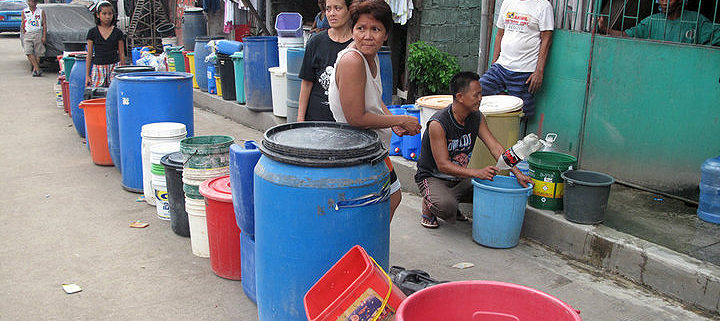Renegotiation of CA not enough without renouncing privatization –WPN
by Water for the People Network
The Water for the People Network (WPN) said that government should renounce water privatization and assert water as a human right whose provision should be under effective public control. This is the most important basis for terminating the concession agreements (CA) between the State and private water firms. The vital public utility should be returned to the public sector, WPN said, and not remain in the hands of profit-seeking water oligarchs.
President Duterte recently ordered the CAs between government and water firms Maynilad Water Systems Inc. and Manila Water Company to be renegotiated. Department of Justice (DOJ) Secretary Menardo Guevarra said that certain provisions of the water CAs are onerous and disadvantageous to both government and consumers. The DOJ began reviewing the CAs upon the instruction of President Duterte at the height of the water crisis during the first quarter of this year.
The onerous stipulations recorded by the DOJ include prohibition against State interference in rate-setting, indemnification for revenue losses due to this interference, and irregular extension of contracts by 15 years. These are issues that have been raised by water rights advocates, WPN said, in the more than two decades since water in Metro Manila was privatized.
“The WPN has long and repeatedly called for the scrapping of the CAs. The CAs are the very epitome of water privatization, which has failed to deliver promised cheaper, cleaner, and more secure water services,” WPN spokesperson Prof. Reggie Vallejos said. Water utilities have to deliver water as a human right, he stressed, and mere renegotiation of the CAs will not truly ensure public interest objectives over private profits.
“The government has not yet revealed its points for renegotiation but we doubt that these will be enough to uphold the public welfare if they are still within the failed water privatization framework and biased towards profitability for water oligarchs,” Vallejos said.
WPN recalled that water privatization has only resulted in more expensive water, with rates increasing seven-fold for Maynilad and ten-fold for Manila Water from the start of the concession in 1997 to the third quarter of 2019. The CA-directed rate rebasing every five years since privatization allowed firms to make profits by charging consumers increasing tariffs including, among others, for projects that fail to push through. WPN added that the CA gives government a key role in rate-setting (judging whether enumerated expenses were prudent and just in the interest of consumers), but nonetheless allows the companies to sue the State should its regulation affect their profit-making.
The water firms also face Supreme Court-imposed penalties for violating the Clean Water Act, with poor sewerage services performance versus targets as of 2018. Meanwhile, water service interruptions have been hounding Manila Water and Maynilad consumers since March 2019.
These problems bring us back to 1997, WPN said, when the Ramos administration invoked a national water crisis and handed over water sourcing, processing and distribution to the private sector. The huge socially-sensitive water utility was handed over to the Ayalas and Lopezes. The biggest water privatization until then was perfectly in tune with the Ramos government’s grand promotion of globalization policies including deregulating the oil industry and liberalizing Philippine agriculture, said the group.
Public sector water operations should be re-established in Metro Manila and the rest of the country as soon as possible, said Vallejos. “These should be returned to the public sector to ensure that profit-seeking does not get in the way of delivering cheap, clean, and secure water services to the public,” he said.
WPN cited the growing global trend of water remunicipalization reversing water privatization. This has already happened in over 231 cities in some 37 countries around the world for instance in Spain, Germany, Argentina, and even in France, home to water multinationals. The poor experience with water privatization is making governments choose public water sourcing and distribution over private control, the group said.
Government’s continued implementation of water privatization is seeing additional oligarchs taking over public control of water, said WPN. Specifically, these are big business interests close to Duterte, for instance, Manny Villar and Dennis Uy who are also in the water business through Prime Water Infrastructure Corp. and Udenna Water and Integrated Services, respectively. Prime Water has been striking joint venture agreements with local water districts in areas nationwide but undermining water services according to a Commission on Audit report, WPN observed.
Simply renegotiating the CAs to let more oligarchs keep profiting from the water business will not remove the ill effects of privatization on the public and may even make it worse, WPN said. Government must bravely decide to take control of the vital public utility and run it as a service rather than for profit, the group said. #







